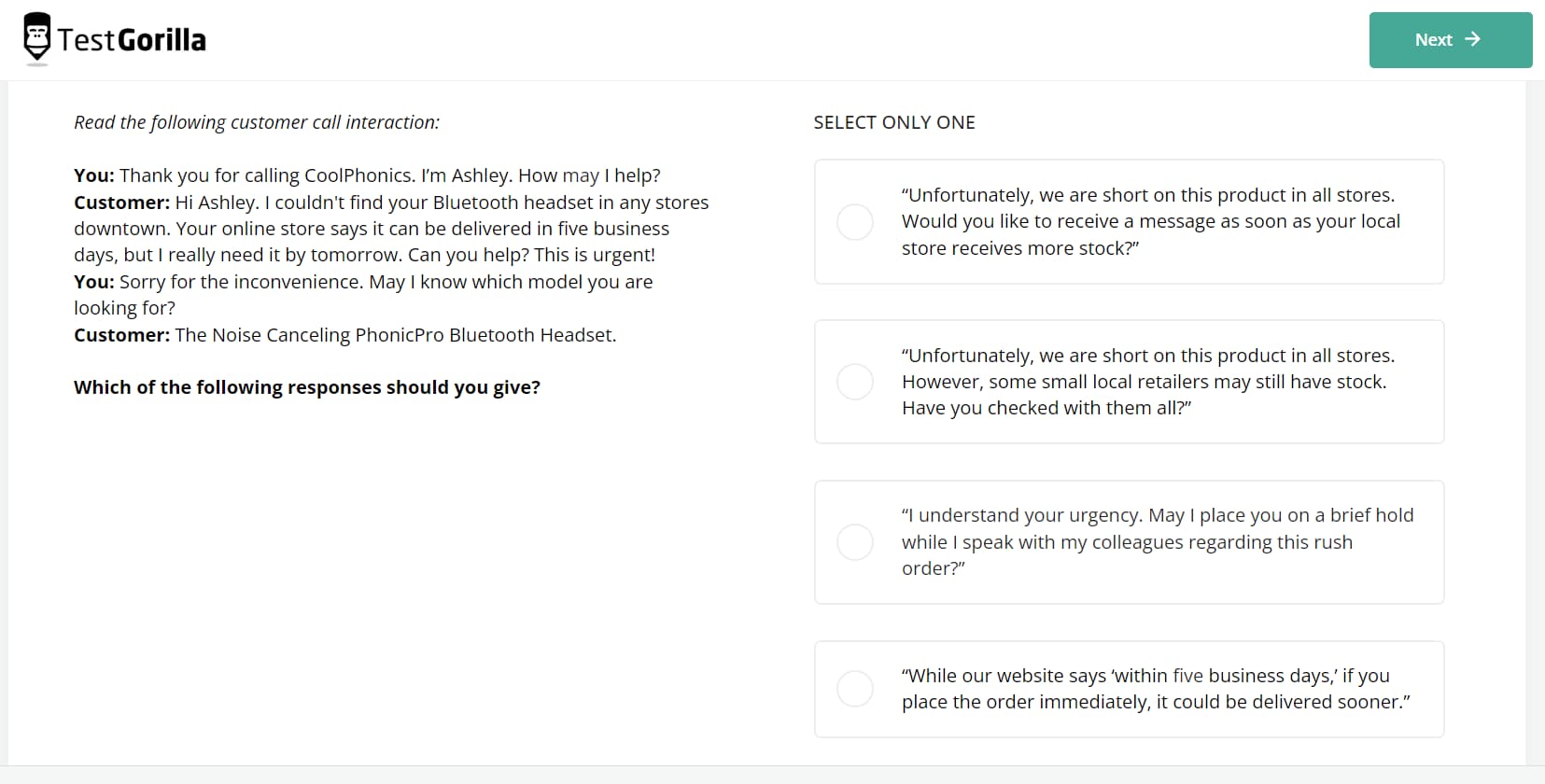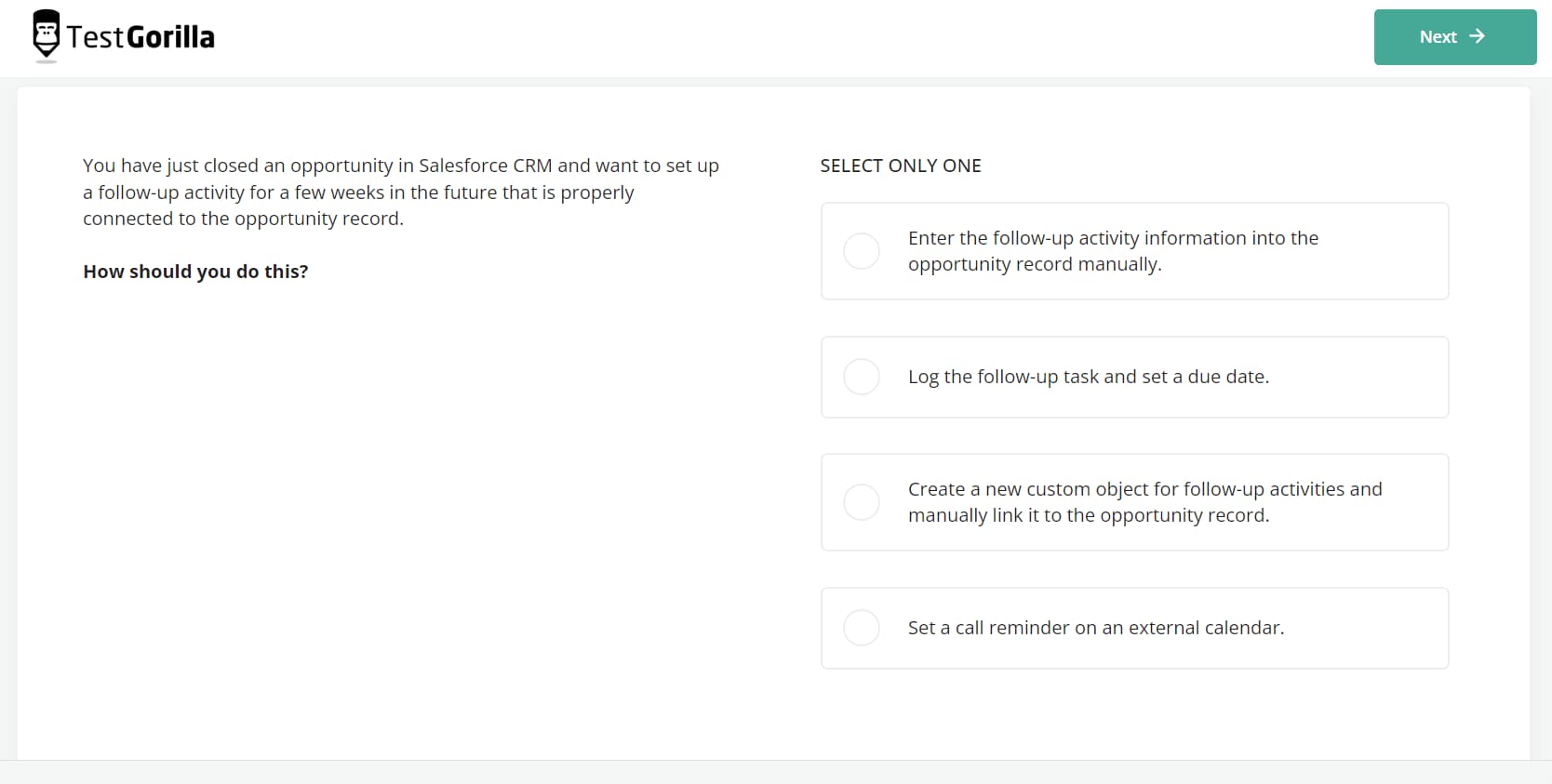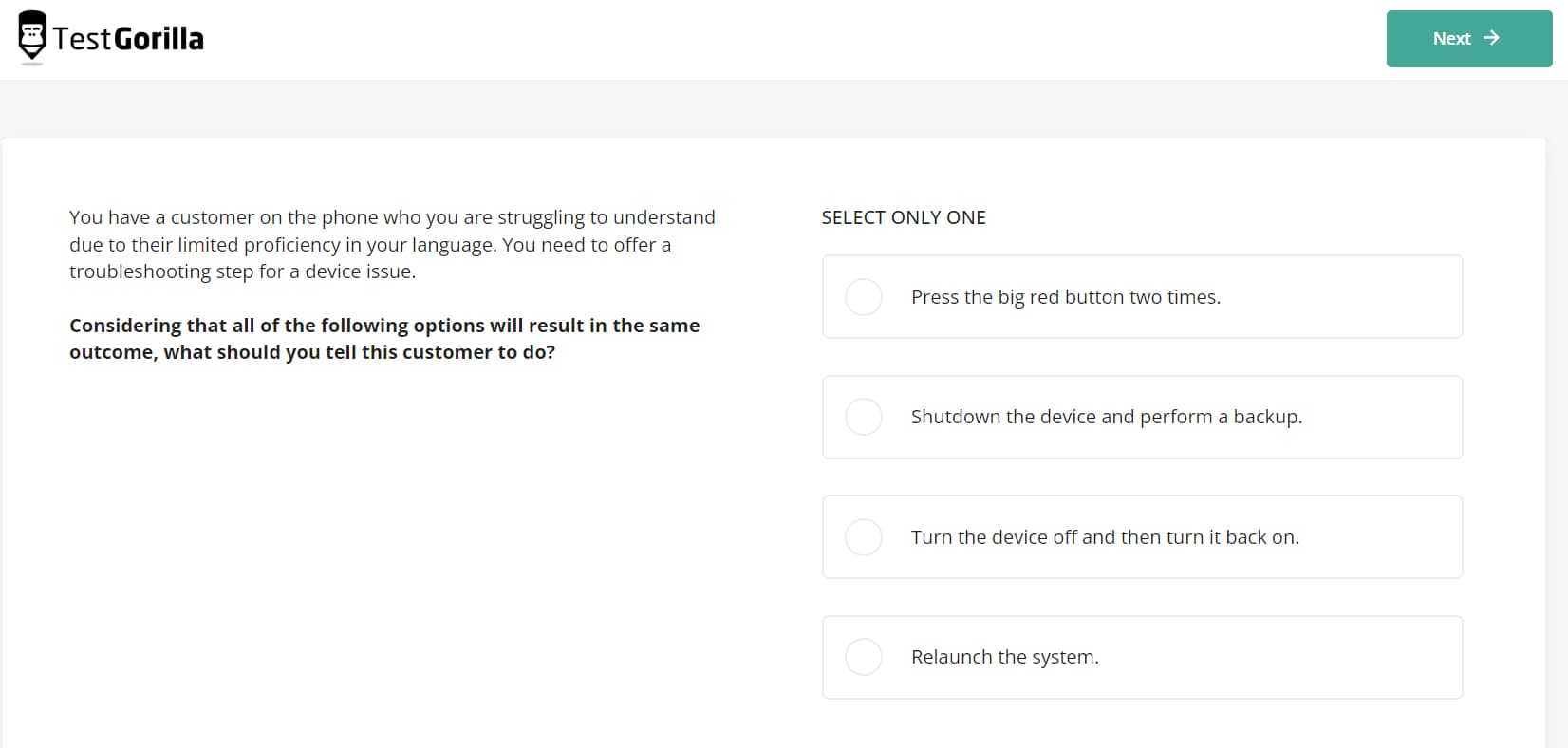Many companies face the challenge of scaling customer service operations to meet increasing business demands.
With the wrong team members, customer service can become a bottleneck, leading to overwhelmed employees and dissatisfied consumers.
Customer service representatives should take care of urgent questions, understand client needs, provide valuable feedback, and improve the overall experience, earning customer loyalty and helping your business succeed.
In this guide, we explain when you need to hire customer service agents, what skill sets to look for, and outline seven steps on how to hire great customer service professionals who can thrive in the role.
Table of contents
- What is a customer service representative?
- When should you hire customer service representatives?
- 9 fundamental skills to look for in an excellent customer service rep
- 7 steps on how to hire customer service representatives
- How much do customer service representatives cost?
- Hire customer service teams with TestGorilla
- How to hire a customer service representative FAQs
What is a customer service representative?
A customer service representative is a professional who interacts with customers on behalf of the company to provide product knowledge, assistance, and support. Their primary responsibility is to address the needs of customers, such as answering inquiries, resolving complaints, and providing product or service information.
Customer service representatives can communicate with customers through various channels, including phone, email, live chat, social media, or in person.
People often use the terms “customer service agents” and “specialists” interchangeably with representatives, but there are subtle differences.
Customer service representatives and agents generally perform the same roles, though it’s more common for a customer service position to be referred to as a “customer support agent” at call centers.
However, customer service specialists usually have a higher level of expertise, so they handle more complex or technical queries.
Before we discuss how to hire a customer service representative, it's important to clarify when it’s necessary to hire one in the first place.
When should you hire customer service representatives?
Providing personalized support almost doubles customer satisfaction and retention. That’s why recognizing the right time to hire ideal candidates for a customer service team is crucial for maintaining high-quality customer interactions.
Here are some key moments to hire customer service agents:
Your company is experiencing rapid growth: Scaling businesses are often flooded with customer inquiries. Monitor metrics like ticket volume, active customer numbers, and response times to recognize when you need to hire customer service reps.
Your self-service tools fall short: When your FAQ pages or chatbots fail to address customer needs, it’s time to hire emotionally intelligent customer service specialists who can handle complex inquiries that automated tools can’t.
Your support team is overworked: If your existing support team is overwhelmed and showing signs of burnout, you need to hire additional customer service agents.
Your success metrics are getting worse: A decline in customer satisfaction scores or other key performance indicators signals that your current team can’t meet customer demands. That’s when you need to hire customer service reps to enhance response times and customer satisfaction.
The best insights on HR and recruitment, delivered to your inbox.
Biweekly updates. No spam. Unsubscribe any time.
9 fundamental skills to look for in an excellent customer service rep
An excellent customer service rep must possess hard and soft skills to handle inquiries efficiently while providing a positive, support-driven customer experience. This balance is key to resolving issues quickly and building lasting customer relationships.
Customer service representative hard skills
So, what are the top customer service skills and qualifications?
During recruitment, look out for the following hard skills where top talent shines:
Hard skills | Importance |
General knowledge of cooperative processes | Fundamental for grasping the core principles of customer service, enabling reps to effectively address inquiries, resolve complaints, and provide high-quality support for companies with different needs. |
Typing speed and accuracy | Key for quickly responding to customer requests. This ensures efficient resolution of more issues in less time, which contributes to customer satisfaction. |
Knowledge of customer service platforms | Essential for efficiently managing customer interactions, tracking issues, and upholding service standards on platforms such as HubSpot, Zendesk, and Salesforce. |
Customer service representative soft skills
Apart from the role-specific skills, you also want potential candidates who have these characteristics of customer service representatives who excel:
Soft skills | Importance |
Communication | Helps customer service reps understand concepts, express themselves confidently, and listen attentively. |
Problem-solving | Enables customer service agents to judge a situation, analyze data and information, and come up with creative solutions to various problems. |
Empathy and perceptiveness | Makes customers feel heard, increasing the likelihood of reaching a favorable resolution. |
Patience | Helps deal with frustrated customers calmly and effectively, ensuring issues are resolved without escalating tensions. |
Multitasking | Enables handling multiple tasks or customer inquiries simultaneously, which optimizes efficiency and reduces wait times for customers. |
Time-management | Ensures representatives can prioritize tasks effectively, manage their workload, and respond to customer inquiries promptly, which is vital for customer service quality. |
7 steps on how to hire customer service representatives
Now that you know what to look for in a customer service representative, it’s time to learn how to hire a customer service agent more effectively.
Here are seven detailed steps on how to find the right candidates and recruit customer service representative agents:
1. Identify your company’s needs and goals
Start by clearly defining the customer service objectives you want to accomplish before you hire customer service specialists and representatives.
The main things to consider are whether you need full-time or part-time employees and whether you want them to work from the office or remotely.
If you’re an established brand with many products and physical stores, it’s better to hire customer service reps full-time. That way, they can better understand the company, which can lead to long-term success.
If you’re a small business owner launching a new product, hiring a part-time freelancer can be a better idea because freelancers are less costly.
In addition, you can collaborate with them on and off based on your company’s needs. This is a good option for companies with fluctuating customer service needs, such as seasonal businesses.
Another thing to consider is whether office or remote work is better for your company.
If you want more control over your employees, then office work is better. It’s also more expensive because you need to rent or own a space and buy equipment.
If you’re on a budget, you can hire remote customer service reps. They work from home using their own computers, saving you money and resources.
2. Define the customer service representative skills you require most
Defining the ideal skills for a customer service representative ensures your customer support team can meet and exceed customer expectations.
Essential hard skills include a comprehensive understanding of customer service principles, proficiency in typing for efficient communication, and a thorough knowledge of CRM platforms.
Soft skills like effective communication, problem-solving, empathy, patience, multitasking, and time management are equally important. These competencies ensure representatives can navigate customer interactions with care, efficiency, and understanding.
Once you decide which skills are the most important, it’s time to figure out how to test for them. The best approach is to use TestGorilla’s talent assessments, such as our Customer Service test.
This talent assessment measures a candidate’s ability to handle customer requests, provide exceptional service, and create positive customer relations. It identifies desirable soft skills like communication, problem-solving, and understanding customer needs.
If you’re wondering how to hire a customer service specialist with the right hard skills, TestGorilla can also help.
For example, our Salesforce CRM Skills test assesses how well your candidates understand the Salesforce CRM system using questions like the one below.
Use talent assessments in your hiring process
If you want to use our talent assessments in your hiring process, get a TestGorilla account.
3. Create an accurate customer service job description
A clear and accurate description in the job posting can help you attract the right talent for your customer service team.
Outline the tasks and responsibilities of the role, the required skills, and qualifications, and the benefits and salary range applicants can expect. For example, a great call center representative job description is welcoming and should mention call volume expectations and available bonuses.
The important thing is to be realistic with your requirements. You shouldn’t disqualify inexperienced but highly motivated and skilled candidates who can thrive in the role.
Use our customer service representative job description template
If you’re unsure what to write for your customer service representative job description, you can use this template. Don’t take it word-for-word – the more you can edit it to match the unique needs of your company, the better.
Job Title: Customer Service Representative
Job Summary: We are seeking a highly motivated and customer-focused individual to join our team as a Customer Service Representative. The role involves providing exceptional service to our customers and assisting them with any inquiries or concerns they have.
Main responsibilities:
Responding to customer inquiries via phone calls, email, and chat in a timely and professional manner
Identifying and resolving customer issues and concerns
Processing customer orders and returns
Maintaining accurate and up-to-date customer records
Collaborating with other departments to ensure high customer satisfaction rates
Required skills and qualifications:
Excellent communication and interpersonal skills
Strong problem-solving and analytical abilities
Basic understanding of CRM platforms
Ability to multitask and manage time effectively
Team-oriented mindset
Detail-oriented and organized
Prior customer service experience is a plus
Experience in a related field, such as sales or retail, is a plus
Salary range: $40,000 to $45,000
Benefits: [list all your company’s benefits] If you want to join our team as a customer service representative at [YOUR COMPANY NAME], please apply below. We look forward to your application.
4. Use the right hiring channels
Whether you want to hire customer service reps in the office or work remotely, here is where to look:
Job boards: In addition to the common platforms like Indeed, you can find contract workers on job boards like Upwork and Fiverr, which offer access to global talent. In addition, remote-only employees can be found on sites like WeWorkRemotely and Remote.co.
Social media: Social media recruiting is a great way to find customer service representatives. You can join Facebook groups, follow hashtags on Instagram, and post job openings on LinkedIn and Twitter.
Employee referral programs: Using the social networks of your current employees, is a great way to find candidates with similar work ethics and capabilities.
Company branding: A positive work environment, happy employees, and great benefits support employer branding and attract more candidates.
5. Create a skills assessment to hire the best customer service representatives
The easiest and most efficient way to find your next customer service representative is through pre-employment skills testing.
With skills tests, you can evaluate candidates’ skills and traits before they reach the interview process. As a result, skills-based hiring helps you find the best talent who aligns with your company’s culture.
You can even perform customer service simulation tests to identify the candidates who perform well in real-world customer service situations.
Here’s how talent assessments can help you hire customer service teams:
Reduce the time-to-hire: Skills tests help you streamline the hiring process and quickly dismiss anyone who doesn’t have the right skills.
Avoid bad hires: On average, hiring the wrong person costs the company around $17,000. Skills are a more reliable job predictor than experience, so talent assessments can help you avoid costly mistakes.
Eliminate hiring bias: Skills testing helps you reduce hiring bias by providing everyone with the same tests and evaluating the answers objectively. In fact, for Contentoo, reducing hiring bias was the number one benefit of using TestGorilla when hiring for customer service roles.
Validate candidates’ skills: With skills testing, you can identify the most qualified candidates before they reach the interview stage of the recruitment process.
Reduce employee turnover: Talent assessments help you reduce turnover by hiring for customer service skills, values, and mindset that align with your company goals, which makes employees stay longer with the company.
So, what does a customer service skills assessment look like?
You select the necessary tests for the customer service role and send them to your candidates. They take a quick talent assessment, then you compare the results and move the best applicants to the next stage.
For example, you can use our Call Center Representative test to find candidates who consistently deliver excellent customer experience. The test assesses verbal communication, teamwork, active listening, and problem-solving skills using questions like:
For more sample questions, please click here.
You can also include additional tests in the overall candidate assessment to get a better idea of who they are. For example, you can use our Culture Add test to see how a candidate’s values and behaviors align with your company culture.
If you want to learn more about skills testing, book a free 30-minute live demo with one of our representatives today.
6. Ask the right interview questions
A structured interview is your chance to get to know your applicants even more, so be sure to ask them the right customer service interview questions.
Remember, you’re looking for empathetic people who can think on the spot and are a great fit for your team. You can use these questions to find them:
General interview questions
Can you give us an example of when you exceeded expectations to satisfy a customer?
What was the most challenging customer service problem you had to address, and what was your approach to resolving it?
According to you, what are the essential qualities that make a customer service representative successful?
What aspect of customer service do you enjoy the most?
Scenario-based interview questions
How do you manage a situation in which an angry customer is yelling on the phone?
What is the best course of action when you receive multiple complaints about a colleague?
How do you determine whether or not to grant a refund request to a customer?
A loyal customer who frequently purchases from our company has received a faulty product. What steps should you take to resolve the issue?
How do you react to a customer canceling their order?
7. Onboard new customer service representatives
Once you’ve selected the candidates to hire, a good onboarding program ensures your new customer service rep feels welcomed by their team and has the confidence to do their job from the start.
For a great onboarding experience, consider:
Developing a structured training that covers essential information
Pairing new hires with mentors for personalized guidance
Providing access to additional resources and materials
Conducting regular feedback sessions to address progress and concerns
Encouraging team-building activities for easier integration
Setting clear expectations and achievable milestones
How much do customer service representatives cost?
In the US, the customer service representative job salary ranges between $17 and $21 per hour, with the average being $18 per hour.
The cost is determined by location, education, years of experience, and additional skills the customer service representative offers. For more information on compensation, check out our guide on what to pay a customer service representative.
Hire customer service teams with TestGorilla
Customer service representatives ensure customers have a pleasant experience when interacting with your brand.
That’s why you need to hire customer service reps with a mix of soft skills like communication and problem-solving and working knowledge of platforms such as Salesforce CRM and HubSpot CRM.
You can test for these skills and find the best candidates using our talent assessments.
Book a live demo or take a product tour to explore our platform’s functionalities and learn how to hire customer service representatives with our talent assessments.
However, the best way to truly experience TestGorilla is to sign up for a free account and start experimenting with our talent assessments right away.
How to hire a customer service representative FAQs
Still trying to figure out how to hire a customer service team? Find answers to the most common questions below.
Why hire a customer service representative?
According to HubSpot, 82% of customers want their questions answered within 30 minutes of their query. Otherwise, you risk losing a sale and potentially destroying your relationship with that customer. This is why having amazing customer service is essential for the success of any business.
The right time to hire a customer service representative is when:
You can’t keep up with constant customer requests
You are unable to meet the increase in workload
Customer complaints are piling up
Sales metrics are going down
You’re experiencing rapid growth
What is required of a customer service representative?
A customer service representative must possess strong communication skills, problem-solving abilities, and a thorough understanding of the company’s products or services. They also should be able to use CRM tools, multitask effectively, and stay patient in customer interactions. Finally, they should be motivated to deliver high-quality customer service and work well under pressure.
What are the 7 qualities of good customer service?
Empathy: Understanding and sharing the feelings of customers
Patience: Remaining calm and patient during all customer interactions
Clear communication: Conveying information clearly and effectively
Knowledge: Thoroughly understanding products or services
Problem-solving: Finding the best solutions to customer issues
Positivity: Maintaining a positive attitude, even in challenging situations
Attentiveness: Carefully listening and responding to customer needs
What are the 3 most important things in customer service?
Understanding customer needs: Accurately identifying and addressing the specific needs and concerns of customers to provide them with the best resolution
Effective communication: Clearly and politely exchanging information while ensuring customers feel heard and understood
Timely problem resolution: Swiftly resolving issues to the customer’s satisfaction, which shows the commitment to excellent customer experience
What are 2 skills required for a good customer service representative?
Empathetic communication: A good customer service representative must master empathetic communication, attentive listening, understanding of customers’ perspectives, and sensitivity and clarity.
Problem-solving skills: Effective problem-solving abilities are crucial to quickly assess a situation, identify the root cause of issues, and devise practical solutions. A representative should be able to offer creative and satisfactory resolutions to customer problems.
What can a customer service representative be promoted to?
After working as a customer service representative, people can advance to higher positions such as customer service specialist, customer service manager, or customer support analyst. These roles involve more responsibilities, including team leadership, strategic planning, and specialized support.
If you’re wondering how to hire customer service representatives for these positions, please scroll up to our step-by-step guide under the “7 steps on how to hire customer service representatives" heading.
You've scrolled this far
Why not try TestGorilla for free, and see what happens when you put skills first.



















